Table of contents
With high customization ability and flexibility, doing online business on the Magento platform is great, but it can be even greater when you know how to utilize helpful tools or software for your store management. Also, keeping track of customers and data online can be intimidating for retailers without any assistance. Hence, Salesforce offers a renowned CRM (Customer Relationship Management) solution with so many benefits for any e-commerce administrator in general and Magento in particular. In this post, we will help you understand what Salesforce CRM is, its usage, and how to make a Magento Salesforce CRM integration.
What is Salesforce CRM?
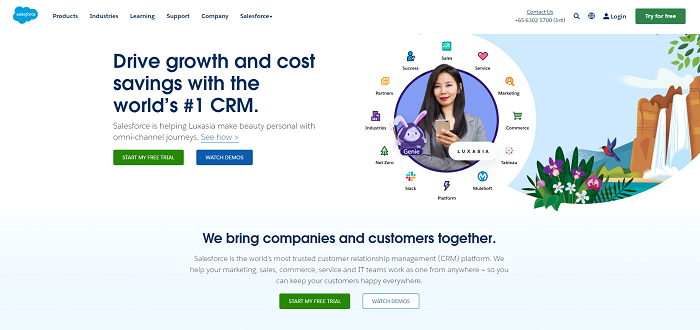
What is a CRM?
CRM or Customer Relationship Management is a strategy, software, or platform that helps businesses manage all the relationships and interactions between them and their customers across the whole customer journey, including engagement, acquisition, and retention.
CRM is essential to the success of business relationships. Data flows and activity records can be flooded and distributed through many channels and sources. Therefore, this solution allows companies to easily store and manage data from multiple channels to better view the whole process and customer relations. Business operators, from sales, marketing, and service to managers, can build more effective strategies to enhance customer engagement and optimize their satisfaction at each touchpoint.
One special thing about CRM is that it ensures all the interactions operate automatically and are recorded in real time, all in one place, making them available and seamless for anyone in the company to access. Moreover, the CRM system is able to integrate with your favorite business tools, and web stores and is especially suitable for businesses of all sizes and growth plans.
Read more: 8 Best CRM Integrations for Magento 2
Salesforce CRM
Among many great providers, Salesforce is considered the world’s #1 CRM, with the mission to “build bridges between companies and customers.” Salesforce offers full-featured CRM software for medium and large enterprises. It provides an all-in-one, user-friendly platform that helps with lead creation, sales management, process automation, collaboration, and marketing activities. Businesses can store, monitor, and analyze customer and prospect data in one consolidated system for all teams’ access.
Salesforce is also a cloud-based platform. This means that Salesforce CRM can offer faster deployment, automatic updates, scalability, increased collaboration, cost reduction, and notably the accessibility of data from any location and on any device, including mobile phones.
As reported by Salesforce’s customers, its CRM system helps increase the number of qualified leads by 30%, revenue by 25%, 49% faster resolution time, and more.
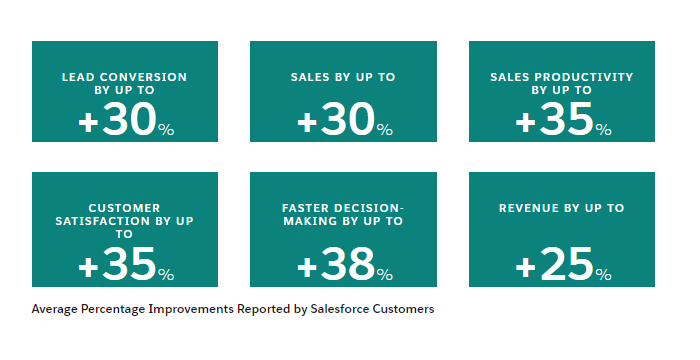
Therefore, with such advantages from both CRM itself and Salesforce’s cloud-based platform, it is remarkably beneficial for e-commerce businesses, particularly on the Magento (Adobe Commerce) platform.
As an open-source platform, Magento is famous for its great potential for customization and scalability thanks to its flexible system, multiple impressive extensions, and great support of Progressive Web Applications (PWAs).
Combining these two powerful solutions, E-commerce businesses are empowered to reinforce customer relationships, streamline processes, and increase profitability.
Why you should integrate Magento 2 with Salesforce CRM?
Here we will clarify how the integration of Magento 2 and Salesforce CRM can benefit online businesses.
Enhance productivity
Increased efficiency is one of the many ways that Magento Salesforce connection helps e-commerce businesses. This integrated solution eliminated the redundant steps in processes through its automated and consolidated system, which simplifies management for any line of business. As a result, this shortens the sales cycle, enhances business production, and saves much operation time and costs. Higher productivity is ensured.
Data synchronization in both directions
Many e-commerce companies today have difficulty keeping up with sales volume, item pricing, delivery, and shipping information. Also, data transmission from Magento stores to CRM systems can consume a great deal of time and effort.
Now thanks to the bilateral synchronization between the Magento platform and Salesforce CRM, this tough task is solved with more than 100 supported data fields. Whenever a customer makes an order on your Magento store’s front end, you can have data automatically synced in real-time to Salesforce’s backend. This ensures constant data and improves the speed and accuracy of operations.
Create an email campaign
As mentioned above, CRM is a powerful tool for Marketers in keeping in touch with customers and converting them into potential leads. Salesforce brings up the Salesforce Einstein tool for launching interactive email marketing campaigns with content tailored to the customer database on their interactions, reactions, and earlier responses/feedbacks. Besides reporting the key metrics of the campaign, Salesforce assists marketers in designing visually appealing emails with the right message for each group of customers. This leads to closer reach to the target audience as well as boosts email click rates.
Manage customer profiles and leads
As CRM keeps track and records any information on customers and their interactions with the company, you will have all the valuable data at your disposal. Administrators can grasp the information on visitors’ time spent on each page, their purchasing history, payments, ordering behaviors, and other buying activities. This helps executives gather an insightful understanding of the customers, which is used to implement suitable sales and marketing strategies and manage customer relationships as well.
However, with so much data drawn from thousands of customers, it becomes difficult to collect, then filter it. But Salesforce CRM comes to assist you in structuring customer profiles, categorizing data from different sources, and deleting duplicated leads.
This enables you to make precise projections and customize customer experiences based on their unique needs.
Analytics and reports
Data is meaningless if there’s no analysis and reporting. As one of the most notable features of this integration solution, Salesforce’s AI can analyze data to generate accurate and detailed reports for trend projections and sales forecasts. This also provides an overview of business performance for managers. Moreover, administrators can approach any metrics to track just by accessing the corresponding fields or categories.
And with these data-driven materials, executives from any line of business can make the most of it to improve their work and customer relationships in general.
Customer support and experience improvement
Regardless of whether brick-and-mortar or online stores, customers do not expect to be kept waiting if they need assistance. By integrating Salesforce CRM with Magento 2, you can keep updated and monitor all customer cases from all channels, hence being able to support them as soon as possible. With so many products and service options available, customer contact and support services are the key competitive advantage for online businesses. Also, administrators can utilize this technology to bring customer satisfaction to the next level by enhancing their experience at important touchpoints.
Increase sales and reduce costs
With bi-directional data synchronization, automated analysis, and centralization features, Magento Salesforce integration can reduce administrative expenses and labor by eliminating redundant work as well as focusing on more effective and productive tasks. This is also mentioned throughout the benefits above. Therefore, not only you can expect a sales increase but also optimize the costs of your business.
Mobile-oriented studio
Moving to mobile commerce has become an indispensable trend for any online business due to the prominence of mobile use as well as the omnichannel shopping experience. And no need to say further about the benefits of adapting your online presence to the mobile system. The Salesforce CRM can push your stores closer to customers and constantly engage with them through mobile marketing approaches like push notifications or SMS, all tailored to fit any target market.
How to integrate Salesforce CRM into Magento 2
Integration through an extension
Step 1: Choosing a suitable extension/service provider
Here we list some extensions to help you connect Salesforce CRM to your Magento store. Consider the features, price plan, and reviews to select suitable extensions.
- Magenest’s Salesforce CRM Integration
- Mageplaza’s Salesforce CRM Integration for Magento 2
- Webkul’s Salesforce Connector For Magento 2
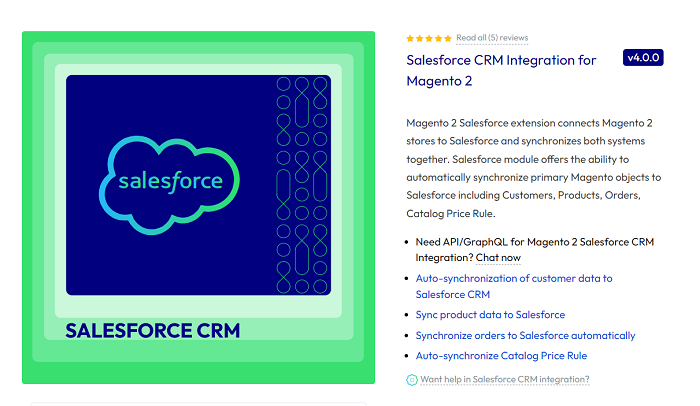
After you have the Magento Salesforce integration extension installed in your Magento store, proceed to the next step.
Step 2: Creating New Connected App in Salesforce
From this step, we will take Magenest’s extension as an example to guide you through the Salesforce integration.
- Sign up and log in to your Salesforce account here.
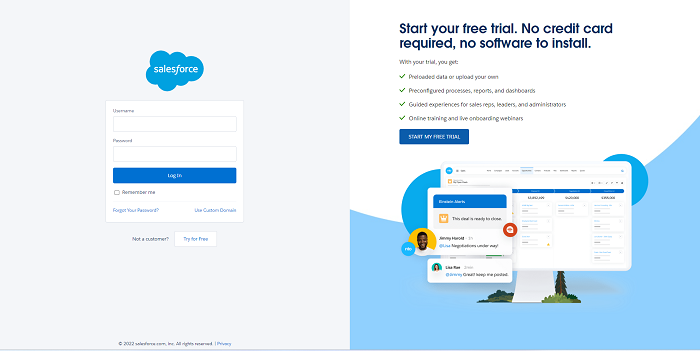
- Proceed with Setup > Apps > App Manager, and click on New Connected App in the top right corner of the page.
- Enter the required information.
- Turn on the Enable OAuth and fill in the Callback URL: “https://your_domain_site/salesforce/oauth/callback” with your domain website.
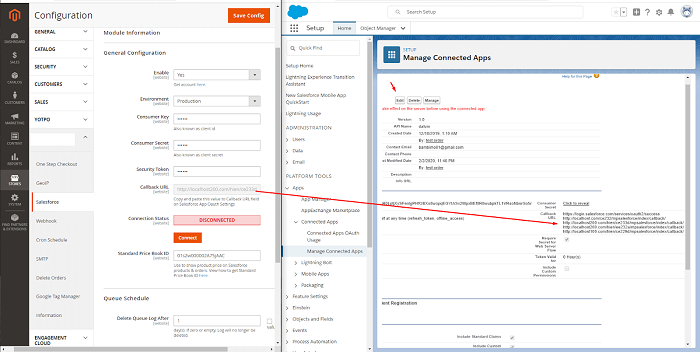
- Select “Full Access” and “Perform requests on your behalf at any time (refresh_token, offline_access)” options from the Available OAuth Scopes list.
- Tick the “Require Secret for Web Server Flow“
- Check the “Include Standard Claims“, “Include Custom Attributes“, “Include Custom Permissions“ boxes.
- Click the “Save” button to save all the configurations.
- Now you can find “Consumer Key” and “Consumer Secret” for later use.
Step 3: Configure Magento Salesforce Integration
- Access your Magento Admin Panel and navigate to Salesforce Integration > Configuration.
- Enter all the necessary information from your Salesforce account and the newly built app here
- Then click “Save Config”.
- You will see a verification page, have a look at all the access rights and click the “Allow” button.
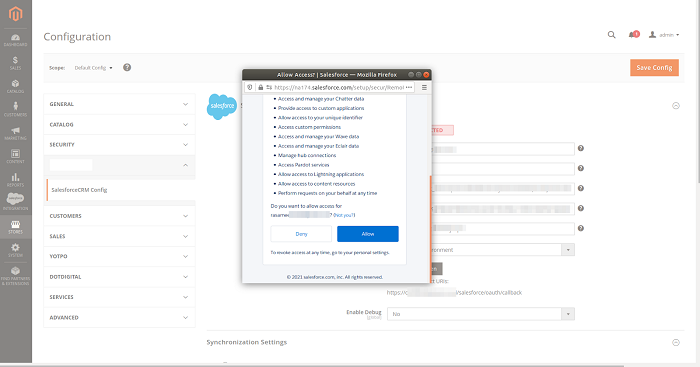
And it’s done. You have successfully integrated Salesforce CRM into your Magento store.
Integration through Zapier
One easier way is to trust a third party to connect for you. We suggest Zapier.
Step 1: Sign up for the Zapier account
Visit Zapier website and sign up for an account.
Step 2: Sign up for the salesforce account
Signup for a Salesforce account here.
Step 3: Integrate Magento 2.x
- After signing up, you log into Zapier, then click on the Make a Zap button to start integrating.
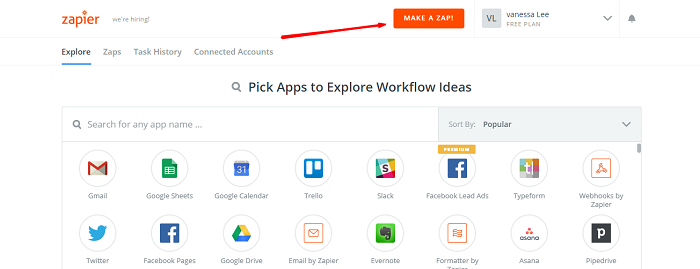
- Now you see a Choose a Trigger App page, choose Magento 2.x to proceed with the integration.
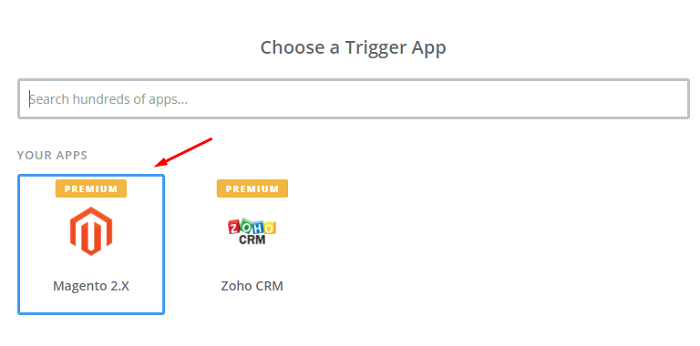
- At select Magento 2.x Trigger, from the list choose New Customer, then click the Save + Continue button and move to the next step.
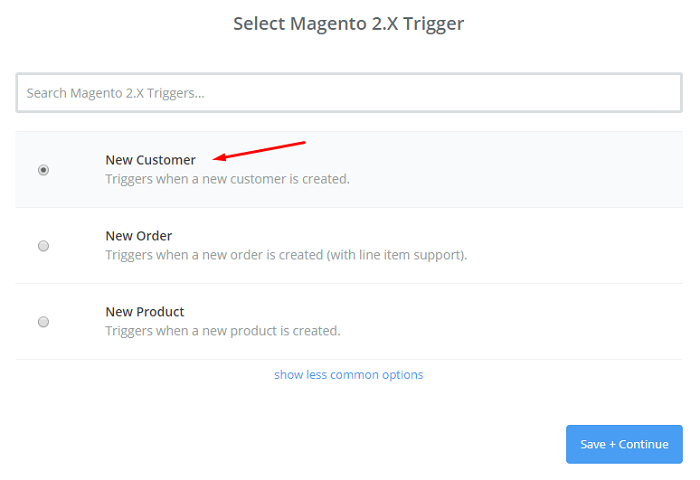
- Next, you will allow Zapier to access to your Magento account by filling out the fields as in the image below, including Full Domain, Admin Username, and Admin Password. After that, click on the Yes, Continue button.
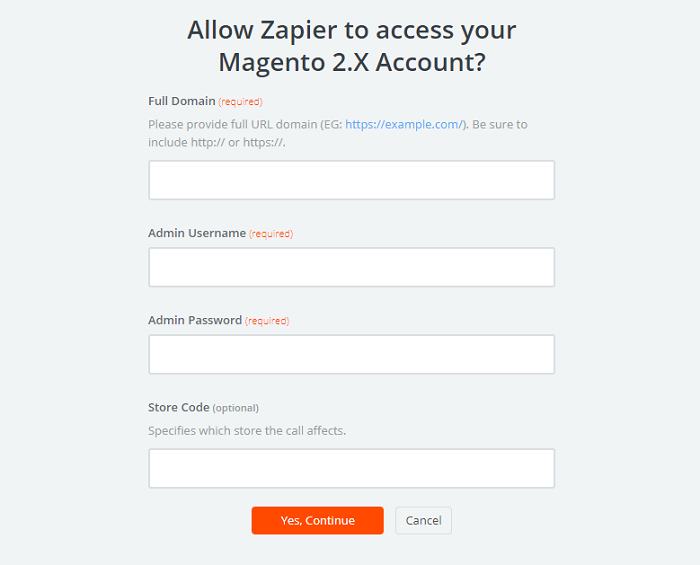
- Move to the Select account step, choose your Magento account then click Save + Continue to finish letting Zapier connect with your Magento account.
Step 4: Integrate Salesforce CRM
- First you choose Salesforce on the Choose an Action App page.
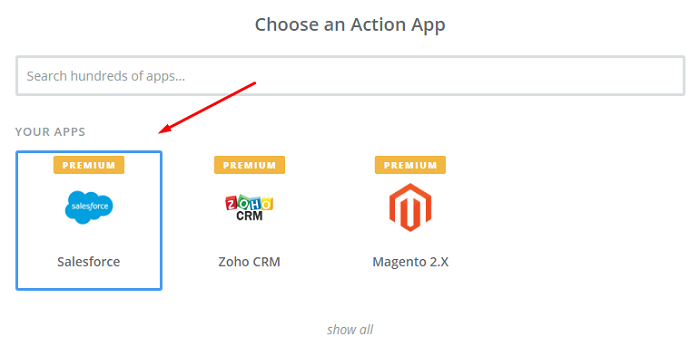
- Then select Create Contact and click Continue.
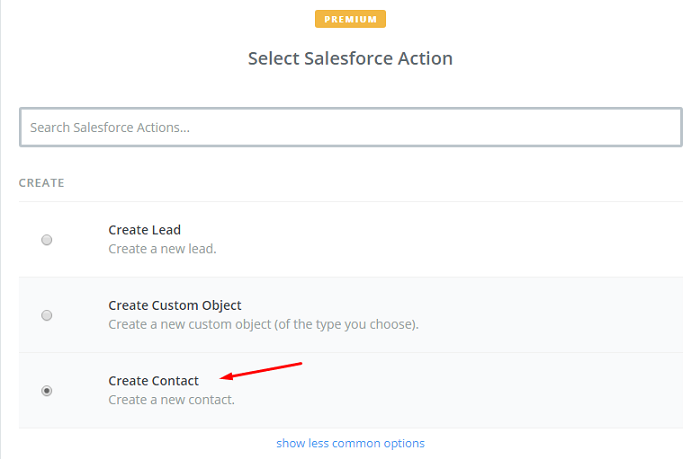
- Like connecting with a Magento account, you select a Salesforce account and click Connect an Account and follow the instructions.
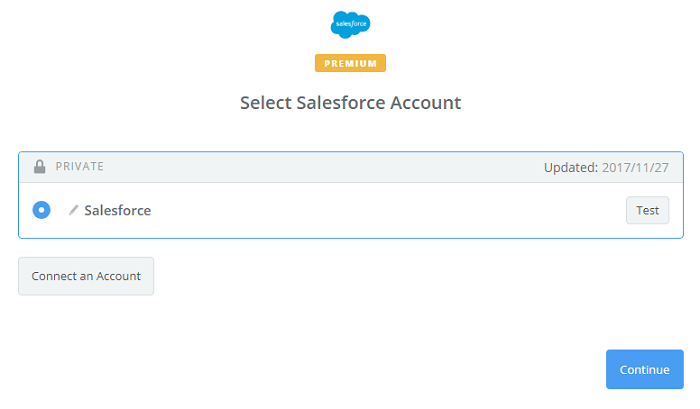
- At this point, you can set up the template. Then Set up Salesforce contact by submitting all the information included, and choose the Continue box when you complete.
- When Salesforce is successfully tested, choose Finish.
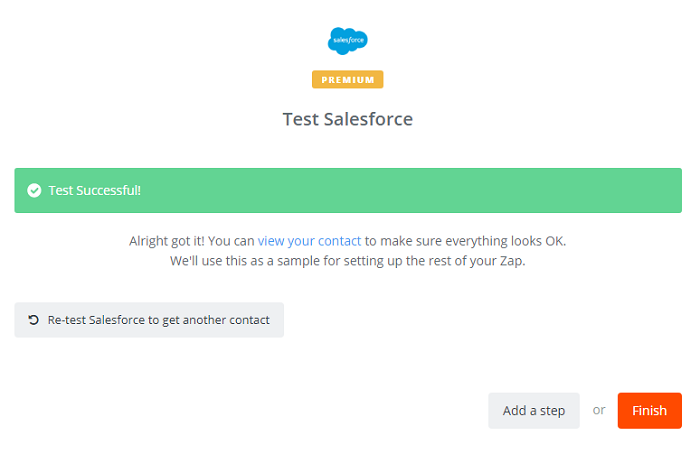
- Now that you’re done, you will see a notification informing you that the integration is done.
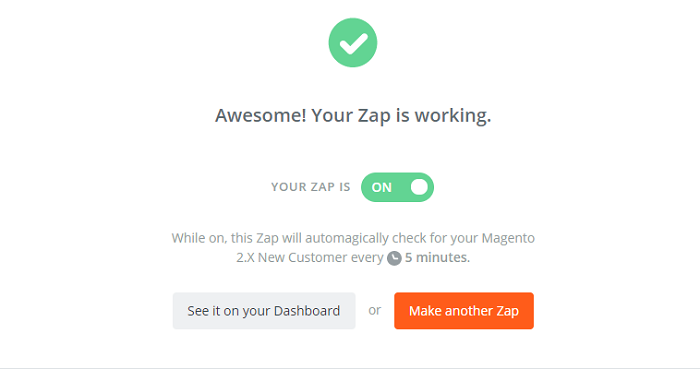
In conclusion, with Salesforce CRM, your relationships with customers can be strengthened by several excellent features all in one place. You can even benefit beyond that with your management process being optimized by automation and smart synchronization functions. Also, the integration of Magento with Salesforce CRM is easy and aided by trustworthy extensions and third-party services, so start connecting now.




